Four Days in June Read online
Page 19
There were perhaps all told 1,000 Germans and Dutchmen in the complex. Plus his own 200 Guards. About to face God knew what lay out there. The cheering had become stronger now, as the French attackers began to gather momentum. Even Macdonell felt a surge of fear.
He looked down at his men as they strained to catch their first sight of the foe. All were unshaven. Many had torn their clothes during the previous night’s exertions at building the defences. His eyes travelling along the line, he ran silently through the litany of their names: Robert Moore, Colour Sar’nt Biddle, the Graham brothers Joseph and James, Joshua Dobinson, Tom Henderson, Atkins, Beckey, McLaurence, Frost, Tarling, Withers, Muirhead. He knew their private fears and dreams and the fact that for the next few hours at least, or as long as it took, they would think only of the battle. Of killing Frenchmen. They were not fearless by any means. All had their terrors. Their particular nightmares. But they knew, as he did, that they were not here to worry. They were here to fight, to obey and to kill, as best they could.
One of the men began to cough. Looked up. Caught his eye. Macdonell felt the anxiety bore into him. Dismissed it. Smiled back.
‘Don’t worry, Frost. They’re not aiming for you. It’s me they’re after.’
The man smiled. His comrades looked round. Macdonell addressed the rest of the line. ‘Stand to, my lads. Make ready. Let’s show them some British play.’
The French guns were firing heavier now. Five or six batteries, he reckoned. The five-pound hollow iron balls came flying over the woods, ahead of the advancing infantry, exploding just over the heads of the defenders, their heavy, red-hot shards, each a lethal missile, tearing at the trees and into the flesh of the men sheltering behind them. Roundshot too came crashing into the woods, but doing no real damage. Occasionally though a cannonball caught the corner of an outbuilding, knocking chips of brick in all directions. A guardsman cursed as a small piece of masonry hit him in the cheek.
Macdonell called out: ‘Stay under cover. Kneel down. Stay close to the hedges.’
Smaller fragments of exploding shell began to fall in the garden, pattering down on the leaves like a weird, heavy rain. Occasionally one would strike home, bringing shock and an oath but few real wounds. From the woods, however, the pop of musketry now began to grow closer. It was clear that the Nassauers were falling back.
Come on, he thought. Come on, you buggers. Come to us. Let us see you. Let us kill you. What was it in battles that always took so damned long?
He realized that Gooch was standing beside him. ‘How goes it, sir?’
‘Gooch. How did you spend the night?’
‘Well, I managed to get under cover, sir. My feet got quite damp though. Still are, to tell the truth. I hear that the First Guards up on the ridge have managed to find some ham and champagne for breakfast. Shall I see if I can beg some, sir?’
Macdonell managed a laugh. ‘I think, Mr Gooch, that the time for breakfast is now past. D’you not? D’you hear that? That’s the French, lad. They’re coming.’
He could hear them in the woods now. Closer. The crash of breaking branches and the ragged shouts of ‘Vive l’Empéreur’ were interrupted by the staccato hammer of muskets as the retiring Nassauers and Hanoverians strained to find their targets in the undergrowth.
Macdonell turned again to his line: ‘Look to your front.’ The words left him instinctively. Unnecessarily.
Colour Sergeant Biddle spoke to them under his breath. ‘Here they come, my boys. Wait till you see ’em clearly now. You’ll have enough time. Let ’em get nice and close. Wait for my word. Then you have my permission to send ’em to Hell. And be careful not to shoot any of them fellers in the green coats. Them’s our allies, remember. Nassooers. Mustn’t shoot them. Nosey would never forgive us.’
Macdonell could see the green coats now, falling back through the wood. Heard muffled cries of command in Flemish and German. Some of the Nassauers, mostly the big grenadiers, were pulling back slowly, in good order, their faces still to the enemy. Others though were running. Boys, pale with fear, panicked by the sight of so many of the enemy. He saw some fall, not to move again. Others gained the safety of the buildings. Crossed the thirty yards of open ground before the garden wall and spilled round the left side of the enclosure and into the cover of the orchard. With them came the Hanoverians, light troops in grey and dark green. Better trained than the Nassauers. Yet they too were pulling back. He was comforted by the knowledge that soon it would be the turn of the French to cross that same expanse of exposed grass. And then the defenders would not hold their fire.
He noticed Wyndham and Elrington beside him, momentarily detached for some reason from their commands, and wondered whether they had managed to make the champagne breakfast up on the ridge. Both officers saluted.
Elrington grinned at Gooch. Noticed he was frowning. ‘Thinking of death, Gooch?’
‘No, Elrington. Well, yes actually, I was.’
‘Oh, don’t worry. You’ll probably end the day a field officer.’
The young ensign smiled. Turned to Macdonell. ‘D’you think he’s right, sir? D’you really think there’s a chance that I’ll get promoted in my first battle?’
Macdonell smiled back, but it was Wyndham who made the reply.
‘He doesn’t mean that they’ll make you a major or a colonel, you young idiot. He means that you’ll be an officer “beneath” the field. Under the sod, old boy. Dead.’
Gooch’s face fell. He looked at the ground.
Macdonell spoke. ‘Enough, gentlemen. We shall all survive this day if we only keep our wits as sharp as yours, Elrington. Eh, Gooch? And now to work. They are upon us, gentlemen. Take your posts, if you please.’
A sputtering volley of musket fire from the hedge to his right signalled that, as he had suspected, the French were attempting to outflank them. The sharpshooters of the 3rd Guards were picking off the skirmishing voltigeurs as they advanced along the valley through the cornfield and attempted with difficulty to climb its deceptively steep slope. Beyond them he glimpsed the flying pennants of accompanying French light cavalry. Lancers. It was a flanking move, sure enough. But this he knew was not the main attack. That would be a different thing entirely. The artillery fire had intensified and several of his men were now wounded. This, he thought, would be the time to remove at least part of his command into the relative safety of the château.
‘Wyndham, bring your men into the buildings. Gooch, tell Dashwood to hold the kitchen garden for as long as he can and then follow us inside the walls.’
Reining his horse round, Macdonell trotted along the west wall and back into the farm through the north gate, dismounting outside the stable block. The Nassau commander, Captain Büsgen, approached him. He looked agitated.
‘Colonel Macdonell. My men are being hard pressed. We cannot hold the wood much longer and I fear that the orchard will soon be lost also. What do you wish me to do, sir?’
‘Captain, may I suggest that you take your men from the château and reinforce those at the garden wall. We shall occupy the buildings. I intend to close the north gate directly. Do not worry. I am sure that reinforcements will be with us in due course.’
With a nod of his head the nervous Nassauer departed, to be replaced by Sergeant Biddle.
‘They’ve taken the woods, sir. The Germans have broke. There’s Nassooers and ’Anaverians runnin’ about all over the place. The Frogs is comin’ on into the orchard too, sir. Shall we meet ’em there?’
Macdonell shook his head. ‘No, Sar’nt. I intend to consolidate here. Inside the walls. But I am quite sure that our commander will already have assessed the situation. I’m willing to wager that we’ll see Colonel Saltoun back here ere long.’
They were joined by Gooch. ‘There are French in the field down by the kitchen garden, sir. Shall I go round to the side of the company? I could take a section, sir, and fire on them down the line.’
‘No, Gooch. Don’t do that. But it was a good idea. And it’
s called an “enfilade”. Send word out to Colonel Dashwood if you would. Tell him to press a counter-attack into the wood and across the French left flank. We must contain them. And Gooch, it’s the flank, not the side. Do try to remember, lad.’
He walked alone back to the north gate, climbed on to one of the improvised fire steps and peered over the wall. He could hear the French to his left and the crash of musketry. Ahead of him and a little off to the right of the approach road two long, red-coated columns were advancing down the hill. Saltoun, as he had guessed, commanded back to the orchard.
As he stood there, more Nassauers, singly and in small groups, began to come past him through the gate. A lieutenant saluted him hurriedly and attempted to regroup his small force. Many, Macdonell noticed, had been wounded.
‘Sir. Colonel, sir.’
It was Gooch again. The boy needed a wet-nurse.
‘Sir, the French are coming in on our right. They intend to take the farm, sir.’
‘I am quite aware of their intentions, Mr Gooch. Have Colonel Dashwood fall back through the north gate directly. Go to it.’
So, they were throwing more men into the cauldron. Macdonell wondered for a moment whether this was really what Napoleon intended. It seemed foolhardy indeed to sacrifice so many men before the château walls. But perhaps Boney too knew that if he could take this place then he would carry the field. He sensed the impending crisis. Found Biddle by the gate.
‘Sar’nt. See that Colonel Dashwood’s men are admitted. Then close the gates.’
Drawn instinctively, as always, towards commotion, Macdonell walked back with haste towards the southern defences. Having pushed the Nassauers out, the French were indeed coming on in strength through the wood. He entered the gatehouse and climbed the stair into the upper room from which on the previous night he had seen Gooch’s men drive off the French cavalry with such ease. Now the scene presented a very different picture. The woods below him were filled with French infantry. Blue coats as far as the eye could see through the white smoke, and beyond them the rising palls that betrayed the fury of the relentless artillery bombardment. The infantry were pushing on directly towards him. Drummers to the fore, their rat-a-tat, rat-a-tat, rata-tata-tata-tat almost overcome with the crash of the muskets. At their front the officers, in mud-bespattered white breeches, whirled round to spur them on. Swords cutting the air, shouting inaudible commands, they reached the edge of the wood. He looked at the first few ranks. All in blue. Some covered in brown or grey coats. Light infantry. Meeting like with like. They were voltigeurs mostly in this first wave, some with great yellow and red plumes that bobbed in the smoke as they sprang from the cover of the trees and, breaking into a run, rushed the wall.
They died in a hail of musket balls. Every man that Macdonell could see went down. Instantly, before the Frenchmen could think for themselves, their officers pushed the next three ranks forward. They moved instinctively, less quickly over the dead, but once in the open ground began to run, and suffered the same fate as their comrades. Yet still they came on. A bullet from a sharpshooter zinged through the open window and smacked into a beam behind him. Macdonell ducked, then looked out again through the smoke. More shots sang out towards the blue ranks. No point in volley fire. They all fell. He saw one man go down quite clearly. A French sergeant. Hit almost simultaneously by four of the three-quarter-inch musket balls, his legs just gave way beneath him. His face looked up directly at Macdonell’s window with a curious, questioning expression. Beside him, another man, hit by as many balls again, was spun right round and came to rest with his eyes turned skywards, facing his own men. Another crumpled exactly like a child’s rag doll. God, thought Macdonell, how easily human life is snuffed out. A guardsman on his right, no more than a boy, one of the new recruits (Valentine, was it?), turned grinning to Corporal Dobinson.
‘I got ’im. Did you see ’im, Corp? Went and jumped up like a bleedin’ hare,’ e did.’
The big Yorkshireman did not bother to turn to reply. Kept firing. ‘Shut up, lad, and just shoot the buggers. Or it’s you who’ll be doin’ the jumpin’.’
Macdonell looked back down into the clearing as it filled with bodies. The French were moving forward more slowly now. More of them tumbling at every pace. Behind them their comrades seemed even less keen for glory and the Emperor’s thanks. Still they walked on, though, pushing their way through the sticks and twigs. Pressing steadily closer. More shouting officers could be heard. A full colonel came into view, conspicuous on his fine white horse. He shouted a ‘Vive l’Empéreur’ and received a ball through the head for his trouble. He fell, but his foot caught in the stirrup and, panicked, his horse ran forward, dragging the dead man with it through the undergrowth until at length mount and corpse parted company.
Another mounted officer followed, his own exhortation, carried aloft on a gust of wind, was quite audible: ‘L’Empéreur récompensera le premier qui avancera.’
Of course the Emperor would reward the first to advance. But, as they could all now see, there were other, greater, eternal riches awaiting those foolhardy enough to venture out beyond the cover of the trees. In front of Macdonell the space between the wood and the garden wall had become a mass of dead and wounded Frenchmen. He tried to count the bodies and at length gave up. And all this in what? Ten minutes. How many rounds? Twenty-five, thirty a man. But they would have to make each shot count. Who was in command up here?
‘Sar’nt Miller. Keep the men firing at will. But keep a close watch on your ammunition. We must not go short.’
Suddenly a lull. Less noise now. Yet still there was the crash of muskets as men continued to find targets at short range or fired blind into the wood. Then, for just a moment, no more Frenchmen came from the trees. They must have gone to ground, he thought. That was good.
He heard a noise from his right. Strained to look out of the window, but saw nothing. A musket ball struck the window embrasure and he tucked his head back in. He could see enough to realize that there was black smoke drifting over from the right. Heard the crackling of a fire. Something was wrong. Something, somewhere was ablaze. But which building?
It had puzzled him that the French had not opened up earlier with more of their artillery. The two howitzers incorporated into each of their batteries would surely have had enough combined firepower to flatten this brick-built château and farm, if not merely set it afire. Perhaps that was what had happened. If so then they must be doomed to abandon their stronghold. They would lose the battle. His heart pounding, Macdonell hurried past the still-firing guardsmen, down the wooden steps and out into the chaos of the courtyard. Men were running in all directions, slipping on cobbles slick with mud, water and blood; carrying ammunition, moving position, helping the wounded. The air was filled with oaths and commands in English, Flemish, German. White smoke billowed and drifted away from the firing platforms. Nowhere, though, could he see a building on fire. Neither was there, as he had feared, any sign of incoming shellfire. He leaned his back against a wall, placed his hands on his breeches and exhaled with relief. Looking up he was surprised to see three cannonballs sail high over his head. Relieved that they came, not from the French, but from the Allied guns up on the ridge. Seeing a flicker of flame on one of the balls, he realized that the gunners were using the explosive shrapnel shells unique to the Royal Artillery, sending them high into the air over the woods. Timed fuses fizzing, they burst in showers of death over the French infantry. From the flashes and cries that now came from that direction, they were clearly hitting their mark.
If only they could all keep this up, the French would surely die in droves. As long as the ammunition held out. Macdonell sensed that the orchard and the left flank would now most need his attention and began to walk away from the wall and past the gate into the formal garden which had predictably been swiftly reduced to a muddy mess. A cry from behind made him turn round.
Dashwood was running across the courtyard, his right arm pouring blood, his men streaming in a
fter him, some being carried. Many were wounded.
‘By God, sir, they’re coming on thick out there. And there’s thousands of them.’
‘Yes, I believe that we are being attacked in some force.’
‘And they’ve fired the haystack, sir.’
That, thought Macdonell, must explain the burning and the smoke. He looked at the young man’s arm. ‘You’d best get that seen to. Dr Whymper is plying his trade in the stable block.’
As the injured colonel walked slowly to the stables, Macdonell turned back towards the dozen or so men manning the north wall.
‘Close the gates as soon as the last man is in.’
He moved towards them over the cobbles. A horseman appeared in the gate. A guardsman: Sergeant Fraser, ever the farmer’s boy, balancing his musket over the saddle, came trotting in astride the blue-saddled mount of a French officer. Grinning, he dismounted and led the horse across to Macdonell.
‘Took her off a French colonel, sir. She’s a fine beast. Would you not agree?’
‘Quite, Fraser. But I do think that matters of horse flesh might wait discussion until we have attended to the business of the moment. We are, in case it has escaped your attention, under attack.’
Fraser, still grinning, snapped to attention and led his new prize to the stable block. Macdonell shook his head. Grinned for a moment and caught sight of Wyndham.
‘Close the gates, Henry. All your men inside, Dashwood?’
‘I think so, sir. All that can be accounted for.’
‘Close the gates then. Bar them. Quickly.’
He could hear the French on the other side. The cheers and shouts of ‘En avant’ and ‘Vive l’Empéreur’. Two guardsmen lifted the great wooden crossbar and hefted it into place on one of the steel lugs. But instants before they could secure it, an axe blade came slicing in with lightning speed through the tiny gap between the doors and with huge force cut the wooden stave clean in two. Instantly the gates sprang back under the force of numbers pressing from outside. And at the same time a volley of shots rang out from the French and came crashing through the timbers. A hundred yards in front of him Macdonell saw George Evelyn yell out as three musket balls tore open his arm from the elbow to the wrist. Staring down at the shattered limb, he sat straight down. His words came as a whisper: ‘Please, help me.’

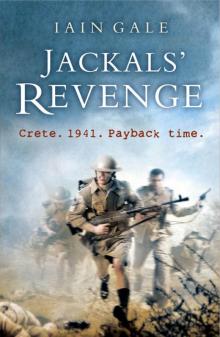 Jackals' Revenge
Jackals' Revenge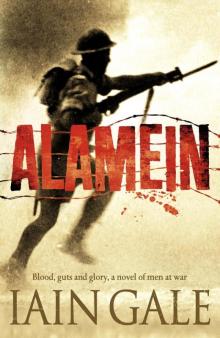 Alamein
Alamein Conspiracy
Conspiracy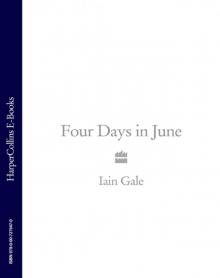 Four Days in June
Four Days in June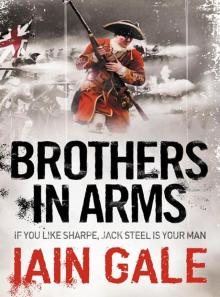 Brothers in Arms (Jack Steel 3)
Brothers in Arms (Jack Steel 3) Brothers in Arms
Brothers in Arms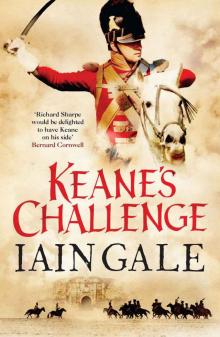 02 - Keane's Challenge
02 - Keane's Challenge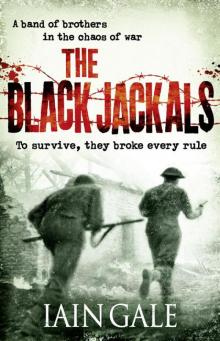 The Black Jackals
The Black Jackals Man of Honour
Man of Honour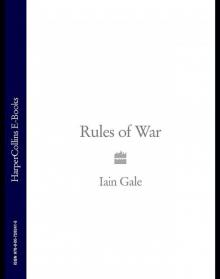 Rules of War
Rules of War